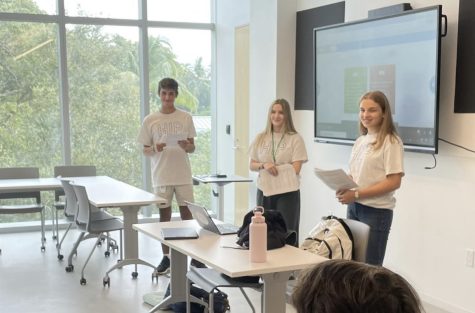Upper School implements new nutrition policies
As part of a new initiative to promote wellness among the student body, on January 30, Ransom Everglades made several changes to lunch at the Upper School campus, adding an organic salad bar and more whole grain options while removing sweetened beverages. In addition to the Dining Hall changes, the school began restricting students from buying snacks from the RE Bookstore during lunch and began limiting bake sales to before and after school.
The RE Bookstore posted an announcement to their Instagram story on January 26, advising students of this new policy. Dean of Student Activities and math teacher Ms. Laura Miller restated this announcement during the following Tuesday assembly, adding that it was for “the health and wellbeing of the students.” Murmurs began to amplify as students reflected on their own habits, expressing concern for their usual lunchtime routine.
These changes came at the recommendation of Wellness in the Schools, a nonprofit that has been advising RE on wellness and nutrition programming throughout the year. Chef Andrew Benson, the executive chef of the Harlem Children’s Zone and RE’s primary advisor from Wellness in the Schools, visited RE to observe and make recommendations on how to improve nutritional health for students. Benson observed that the options being presented to students “could be healthier” and “presented better, tastefully and visually.” His recommendations seek to catalyze the development of a wellness plan for RE that supports “nutrition, environment, mindfulness, sleep and physical activity,” he said, with the goal of eliminating processed foods and using more locally sourced products.
Mrs. Isis Perez-Gonzalez, RE’s Director of Counseling and Wellness Coordinator, said the rationale behind these changes is “to promote focus on wellness during lunch and reduce the amount of sugary items available on campus.”
“Sugar affects the mental performance of the brain, creating lack of focus, memory impairment and high stress levels,” Mrs. Perez-Gonzalez said. She also asserted that lunch “shouldn’t be a time to work or meet with teachers … It should be a time to eat and interact with friends.”
Mrs. Perez-Gonzalez said that students should feel motivated to express their recommendations and concerns as the school moves along this process, pointing to the addition of Greek yogurt, which was recommended by a student in a survey done last year.
Student reactions to the new policies were mixed. Leah Diamond ’24 does not see her lunch habits being affected, as she usually just eats the lunch provided. She said, however, that she could “see how some people might feel like they have less options.”
Emma Holtzman ’24 had a different perspective. “Since the bookstore’s been closed during lunch, I find myself feeling hungrier as the day goes on,” she said.
Other students pointed to previous years in which lunch options were more expansive due to a different schedule. In the view of Diana Gonzalez ’24, having one lunch block for every person on campus will inevitably lead to dissatisfaction. “We have so many people eating at once,” she said. “We need to have staggered lunches to have better quality and therefore healthier food.”
Mrs. Perez-Gonzalez noted that the Health and Wellness Board is open to feedback from students on how to make the food provided more accessible, and Chef Benson also encouraged students to take ownership of their nutrition education.
“In my perspective, learning how to take care of your health is as important as any subject taught in school,” he said.
Emma Dvorkin '24 is a senior at Ransom Everglades School and the Editor-In-Chief of the RE Catalyst. She is a fellow of the RE Bowden Fellowship and is...






